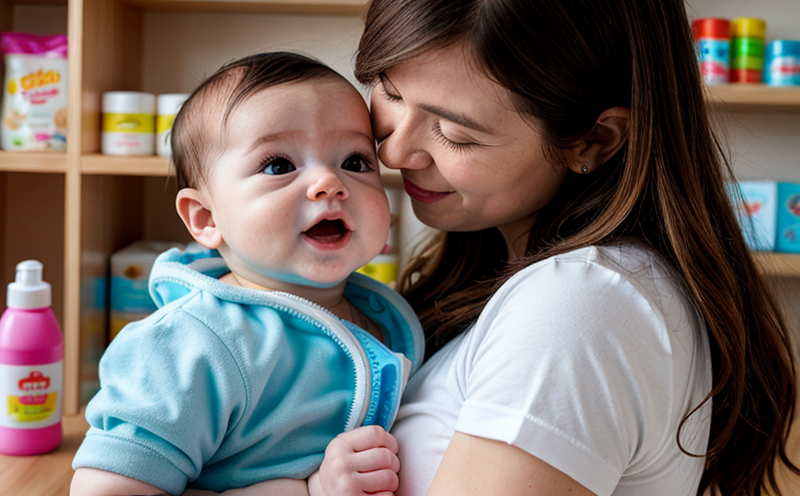Hygiene and Cleanability Testing of Baby Feeding Products
In today’s highly regulated environment, ensuring the hygiene and cleanability of baby feeding products is paramount. These items include bottles, nipples, pacifiers, and other accessories used in infant nutrition. Hygiene is critical to prevent the spread of pathogens that can harm infants’ delicate immune systems. Cleanability ensures that these items can be thoroughly cleaned and disinfected, maintaining their safety over repeated use.
Baby feeding products are frequently subjected to rigorous testing protocols set forth by international standards such as ISO 8682 (plastic materials for baby bottles) and ASTM F967-14 (nipples). Compliance with these standards is essential for product safety and consumer trust. Testing focuses on several key areas:
- Bacterial growth inhibition
- Residue detection post-cleaning
- Material compatibility and biocompatibility
- Rinse residue analysis
- Thermal stability under sterilization conditions
The testing process typically involves simulated usage scenarios, such as the number of times a bottle can be filled and cleaned. This helps simulate real-world conditions that users encounter. Post-use cleaning trials are conducted to ensure no harmful residues remain after multiple cycles.
Material selection is critical, especially for plastics, rubber, silicone, and glass components. These materials must withstand repeated sterilization without degrading or releasing toxic substances into the formula or water. Additionally, the testing ensures that the product’s design facilitates easy cleaning and drying to prevent bacterial growth.
The methodology involves a combination of chemical analysis, microbiological assays, and mechanical testing. Microbiological cultures are used to assess any potential contamination post-cleaning. Chromatography techniques may be employed to detect trace amounts of residues from detergents or other cleaning agents. Mechanical tests evaluate the durability of the materials under repeated filling and emptying.
Given the critical role these products play in infants’ health, stringent quality control measures are necessary. The testing process is designed to identify potential risks early on, ensuring that only safe, hygienic products reach the market. This not only protects consumers but also enhances brand reputation by demonstrating a commitment to product safety.
Testing these items under various conditions helps manufacturers optimize their designs for both hygiene and ease of cleaning. By adhering to strict protocols, companies can ensure that their products meet global standards, thereby gaining trust in the marketplace.
Eurolab Advantages
At Eurolab, we provide comprehensive hygiene and cleanability testing services tailored specifically to baby feeding products. Our expertise lies in delivering accurate and reliable test results that meet international standards like ISO and ASTM.
- State-of-the-Art Facilities: Equipped with advanced instrumentation capable of simulating real-world usage conditions.
- Experienced Technicians: Our team comprises professionals with extensive experience in product safety testing, ensuring precise and reproducible results.
- Comprehensive Reporting: We provide detailed reports that include all test parameters and compliance status. This helps quality managers make informed decisions quickly.
- Custom Solutions: Eurolab offers tailored solutions for specific product requirements, ensuring comprehensive testing coverage.
We pride ourselves on our commitment to excellence in every aspect of the testing process, from initial consultation through final report delivery. Our goal is to support companies in maintaining high standards of product safety and compliance.
Customer Impact and Satisfaction
The impact of our hygiene and cleanability testing extends beyond ensuring regulatory compliance; it enhances customer satisfaction and brand reputation. By identifying potential issues early, manufacturers can improve their products, leading to higher-quality offerings that consumers trust.
- Enhanced Consumer Confidence: Products that pass rigorous hygiene tests are more likely to gain consumer acceptance, bolstering market share.
- Better Product Design: Testing helps manufacturers refine their designs for better cleaning and hygiene, which can lead to product improvements.
- Informed Decision-Making: Detailed reports provide quality managers with the insights they need to make informed decisions regarding production processes and product development.
Our focus on customer satisfaction is reflected in our consistently high levels of repeat business. Companies trust us because we deliver accurate, timely results that help them stay ahead of market trends and regulatory changes.
International Acceptance and Recognition
Baby feeding products must comply with strict hygiene standards recognized globally. Testing conducted at Eurolab ensures that these products meet the stringent requirements set by international bodies such as ISO, ASTM, EN, and IEC.
The International Organization for Standardization (ISO) provides guidelines on material compatibility and biocompatibility, while ASTM offers specific standards for nipples and other components. The European Committee for Standardization (CEN) and the European Committee for Electrotechnical Standardization (CENELEC) provide additional context through EN and IEC standards.
Compliance with these standards is not only a legal requirement but also a mark of quality that enhances consumer confidence. By adhering to global standards, manufacturers ensure their products are recognized worldwide, opening up opportunities for international sales.





